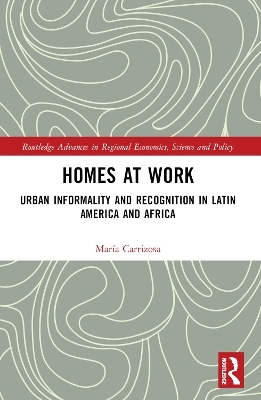
Homes at Work
Urban Informality and Recognition in Latin America and Africa
Seiten
2024
Routledge (Verlag)
978-1-032-28625-9 (ISBN)
Routledge (Verlag)
978-1-032-28625-9 (ISBN)
- Lieferbar (Termin unbekannt)
- Versandkostenfrei innerhalb Deutschlands
- Auch auf Rechnung
- Verfügbarkeit in der Filiale vor Ort prüfen
- Artikel merken
Following the outbreak of the COVID-19 pandemic, working from home became a global phenomenon, yet before 2020, it was a relatively understudied practice. But in informal settlements, the definition of "home" and "employment" is completely intertwined, which is why there is so much to learn from them. For over half a century, mainstream theoretical approaches to urban informality, dominated by development economics, often fail to see this economic and spatial phenomenon jointly. Labor studies tend to be space-blind and spatial studies often disregard informal employment. Profoundly interdisciplinary, this work connects scholarship in development, public policy, labor studies, and feminist economics, with that in urban studies, planning, housing, architecture, and visual studies.
The book walks the reader behind the closed doors of working homes that make the fabric, both social and economic, of most cities. It applies a visual methodology to reveal their "space-use intensity" and quantify the extent to which houses in informal settlements fill their inner pores with economic activity and community services. The research also revisits urban formalization policies in Latin America and Africa, to uncover a fallacious politics of recognition. It ultimately argues for a recognition continuum: an approach to urban informality that is more practical and fairer.
The book is of interest to development economists, urban scholars, public policy specialists, time-use researchers, and architects working on housing, employment generation, urban livelihoods, gender studies, and related topics.
The book walks the reader behind the closed doors of working homes that make the fabric, both social and economic, of most cities. It applies a visual methodology to reveal their "space-use intensity" and quantify the extent to which houses in informal settlements fill their inner pores with economic activity and community services. The research also revisits urban formalization policies in Latin America and Africa, to uncover a fallacious politics of recognition. It ultimately argues for a recognition continuum: an approach to urban informality that is more practical and fairer.
The book is of interest to development economists, urban scholars, public policy specialists, time-use researchers, and architects working on housing, employment generation, urban livelihoods, gender studies, and related topics.
María Carrizosa is Associate Director of Global Housing Policy at Habitat for Humanity International.
1. Introduction 2. Urban informality: mainstream theories and visible alternatives 3. Space-use intensity in informal settlements in Bogotá 4. The politics of urban formalization in Bogotá 5. Space-use intensity and urban formalization in African cities 6. Conclusion
| Erscheinungsdatum | 17.05.2023 |
|---|---|
| Reihe/Serie | Routledge Advances in Regional Economics, Science and Policy |
| Zusatzinfo | 5 Tables, black and white; 43 Line drawings, color; 37 Halftones, color; 80 Illustrations, color |
| Verlagsort | London |
| Sprache | englisch |
| Maße | 156 x 234 mm |
| Gewicht | 460 g |
| Themenwelt | Naturwissenschaften ► Geowissenschaften ► Geografie / Kartografie |
| Sozialwissenschaften ► Ethnologie | |
| Sozialwissenschaften ► Soziologie ► Spezielle Soziologien | |
| Wirtschaft ► Volkswirtschaftslehre | |
| ISBN-10 | 1-032-28625-3 / 1032286253 |
| ISBN-13 | 978-1-032-28625-9 / 9781032286259 |
| Zustand | Neuware |
| Haben Sie eine Frage zum Produkt? |
Mehr entdecken
aus dem Bereich
aus dem Bereich
über eine faszinierende Welt zwischen Wasser und Land und warum sie …
Buch | Hardcover (2023)
dtv (Verlag)
24,00 €
Buch | Hardcover (2024)
Schweizerbart'sche, E. (Verlag)
24,00 €
Eine Einführung in die spezielle Mineralogie, Petrologie und …
Buch | Hardcover (2022)
Springer Spektrum (Verlag)
59,99 €


